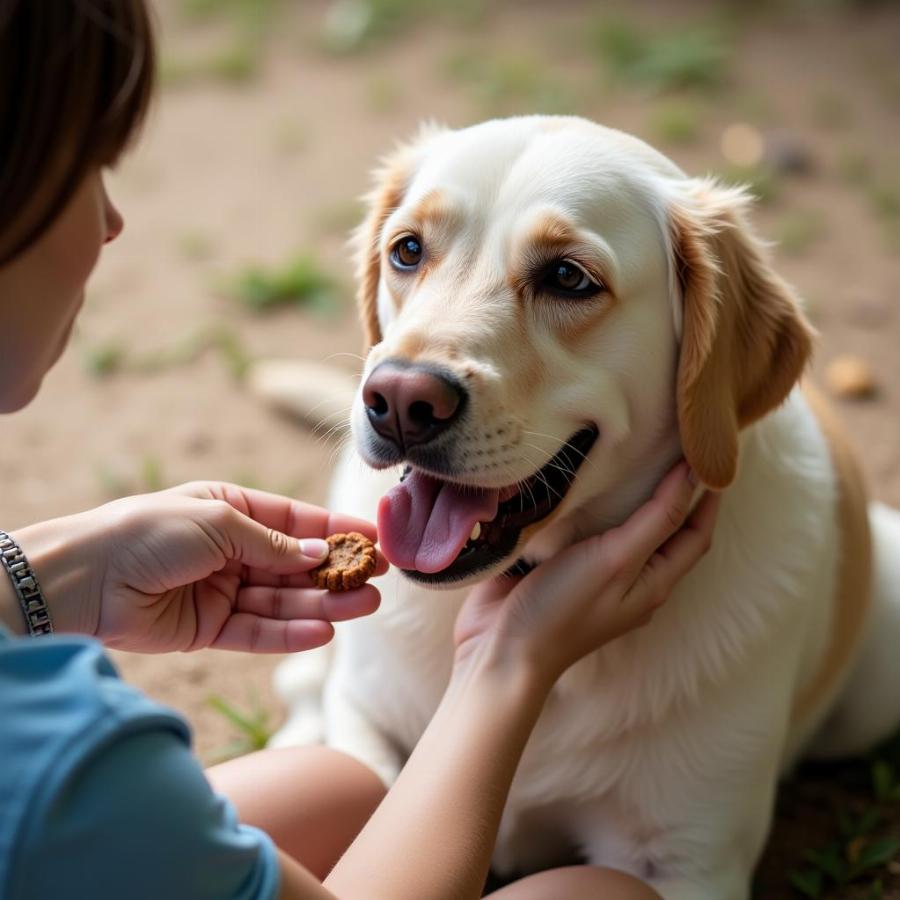Understanding when your canine companion enters their senior years is crucial for providing the best possible care. While “what age is considered senior for dogs” is a common question, there isn’t a single magic number. Several factors, including breed size and individual health, influence a dog’s aging process. However, generally, larger dogs age faster than smaller dogs, meaning they reach their senior years earlier.
Understanding the Senior Stage in Dogs
While chronological age offers a starting point, observing your dog’s physical and behavioral changes is key to identifying their transition into seniority. Just like humans, dogs experience gradual shifts as they age. These changes can manifest in different ways, from a decrease in energy levels to alterations in coat texture and even cognitive function. Knowing what to look for allows you to adapt your care and ensure your furry friend enjoys a comfortable and fulfilling senior life. So, when do these changes typically start to appear? Let’s delve into the factors that determine when a dog is considered a senior.
Breed Size and Seniority: A Key Factor
Breed size plays a significant role in determining when a dog is considered a senior. Giant breeds like Great Danes and Mastiffs tend to age faster, reaching their senior years around 5-6 years old. Large breeds such as German Shepherds and Golden Retrievers typically enter their senior phase between 7-8 years old. Medium-sized dogs, like Border Collies and Australian Shepherds, are often considered senior around 9-10 years of age. Smaller breeds, such as Chihuahuas and Yorkshire Terriers, enjoy a longer youth and generally reach their senior years around 11-12 years old.
Recognizing the Signs of Aging in Your Dog
Beyond breed size, individual variations exist. However, some common signs indicate your dog is entering their senior years. Decreased activity levels, stiffness, and difficulty navigating stairs are physical indicators. Changes in sleeping patterns, increased thirst, and alterations in appetite can also signal the aging process. Cognitive changes, such as confusion or disorientation, might also become apparent.
Adapting Care for Your Senior Dog
Once you determine your dog is a senior, adapting their care becomes crucial. Regular vet checkups are essential for monitoring their health and addressing any age-related issues. Adjusting their diet to meet their changing nutritional needs is also vital. what temperature is ok for dogs to sleep outside is especially important for senior dogs as they are more sensitive to temperature changes. Providing comfortable bedding and ensuring they have easy access to food and water become increasingly important. what is the best flea shampoo for dogs is a question you should also consider, as older dogs can be more susceptible to parasites. Maintaining mental stimulation through gentle play and interactive toys can help keep their minds sharp.
How can I tell if my dog is becoming a senior?
Look for changes in activity levels, mobility, sleep patterns, appetite, thirst, and cognitive function.
What are some common health issues in senior dogs?
Arthritis, dental disease, kidney problems, and cognitive decline are common in senior dogs.
Maintaining Quality of Life for Your Senior Companion
Aging is a natural process, and while you can’t stop it, you can certainly support your senior dog to live their best life. Providing a loving and supportive environment, adapting to their changing needs, and prioritizing their comfort are key to ensuring they enjoy their golden years. do vets recommend collagen sticks for dogs might be something to discuss with your vet to support joint health in your senior dog. Remember, every dog ages differently, and paying close attention to your furry friend’s individual needs is essential for maintaining their quality of life.
 Caring for a Senior Dog
Caring for a Senior Dog
Conclusion
Determining “what age is considered senior for dogs” isn’t about a specific number, but rather understanding your dog’s individual aging process. By considering breed size, observing physical and behavioral changes, and adapting their care, you can ensure your senior canine companion enjoys a happy, healthy, and comfortable life. sweet potato chews for dogs can be a good treat option for senior dogs as they are easily digestible.
FAQ
- At what age should I start considering my dog a senior? This varies by breed, but generally between 7-12 years old.
- How can I support my senior dog’s joint health? Consult your vet about supplements, medications, and appropriate exercise.
- Should I change my senior dog’s diet? Yes, a senior-specific diet can cater to their changing nutritional needs.
- What can I do to keep my senior dog mentally stimulated? Provide interactive toys, puzzles, and gentle play sessions.
- How often should I take my senior dog to the vet? At least twice a year for checkups and preventative care.
- Are there any specific grooming needs for senior dogs? Yes, they may need more frequent brushing and bathing due to changes in their coat and skin.
- How can I make my home more comfortable for my senior dog? Provide orthopedic beds, ramps for stairs, and easy access to food and water.
Explore More about Senior Dog Care on Beaut Dogs
You might also be interested in these related articles: what age is a dog a senior
Beaut Dogs is your trusted source for comprehensive information on all aspects of dog ownership, from choosing the right breed to providing expert care. For personalized advice and support, contact us at [email protected] (Email address). Beaut Dogs is dedicated to empowering dog owners with knowledge and resources to help them provide the best possible care for their beloved companions.